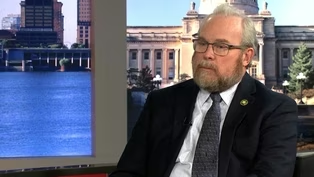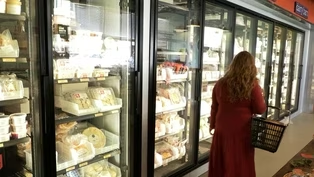
Book Highlights Work of 'Peacekeepers'
Clip: Season 4 Episode 84 | 4m 43sVideo has Closed Captions
Louisville 'Peacekeepers' tell their stories about working to prevent violence in a new book.
A group of ‘Peacekeepers’ is working to improve communities and save lives across Louisville. The Louisville Story Program and Cities United are helping to tell their story.
Problems playing video? | Closed Captioning Feedback
Problems playing video? | Closed Captioning Feedback
Kentucky Edition is a local public television program presented by KET

Book Highlights Work of 'Peacekeepers'
Clip: Season 4 Episode 84 | 4m 43sVideo has Closed Captions
A group of ‘Peacekeepers’ is working to improve communities and save lives across Louisville. The Louisville Story Program and Cities United are helping to tell their story.
Problems playing video? | Closed Captioning Feedback
How to Watch Kentucky Edition
Kentucky Edition is available to stream on pbs.org and the free PBS App, available on iPhone, Apple TV, Android TV, Android smartphones, Amazon Fire TV, Amazon Fire Tablet, Roku, Samsung Smart TV, and Vizio.
Providing Support for PBS.org
Learn Moreabout PBS online sponsorshipYou're about to hear the story of 12 Peace Keepers, a group working to improve communities and save lives all across Louisville.
It's from the Louisville Story Program, a group focused on highlighting untold stories.
And Cities United, a national group dedicated to public safety and violence prevention among African American men and boys.
What we think is that, it is too frequently the case that our neighbors and our communities in Louisville had their stories told for them or about them or at them.
We believe that, those those experiences when we were able to inhabit or spend time with our neighbors in a really robust way, the, the sort of empathetic understanding is greatly increased and that people are the experts of their own experience, really, and can can tell their stories better than anyone.
I think I think one of the biggest drawbacks to the whole CBA of the Community Violence Intervention Initiative and ecosystem is that folks don't understand the work, you know, and the magnitude of the work or what goes into it.
Community awareness is what I'm hopeful will come out of the book, and folks paying attention to the fact that there are some people whose whose whole life is involved in doing the work and keeping people alive.
I'm to up to about, work program and, working with kids, in all different areas of the city.
I've worked Metro Parks and Recreation, the Boys and Girls clubs, private entity churches.
So I was more or less interviewed about, how did I get to to respond and work in a peaceful way?
And how did I get to bring network kids together from all areas of the city?
We put our life on the line doing this work.
I mean, you know, my life has been threatened and this has been our kind of craziness, but you can't be fearful and be effective at the same time.
Everybody who does this work has their own story of pain and purpose.
And so this work is for people like me who've had a painful journey, who wanted to turn around and turn it into purpose.
And so my purpose is I want it to be for other young kids.
What people were for my kids in the 90s.
If I had to pick a couple of themes, or concerns that come up in the book across all of the 12 chapters that I think are most resonant, most important, it's really that relationships are the site of the answer to these problems that people who come from the communities most impacted by community violence have the solutions in ways that are largely underreported, that community, violence is, that the solutions to community violence are really a new understanding of what public health looks like, and one that's not, dictated by or dominated by, you know, emergency services or policing and one that understands that, community health is really needs to be community led.
My takeaway for this book is that people really know how dangerous this work really, really is.
And then they know how invested we really, really are.
And we're not invested from a financial standpoint.
We're invested from a heart standpoint.
So I tell people this is not hard work.
This is hard work.
And I believe everybody in that book, their heart is in this work.
Folks are always concerned with the number of homicides and up and down on those numbers.
And in all of those numbers of people, people we've dealt with over the years, and the numbers don't even come close to the people who aren't part of the numbers.
So that's the story we wanted to try to help to tell.
That's why this book is so important, is because it's really difficult to tell the story of a murder that didn't happen.
And that's what these folks are out here doing every, every day.
And I really mean that, they're keeping people from being killed.
You know, that's a huge part, is to save a life.
You know, everybody knows somebody that there was somebody would intervene with.
And we just happen to be those folks.
When people read this and see this and this whole, even the ones that think that the dump fell so far back that but somebody out there cares about you, somebody's willing to work with you, and somebody is going to be in your corner no matter what.
The book You Got to Be of the people was released today.
Government Shutdown Could Strain Food Banks
Video has Closed Captions
Clip: S4 Ep84 | 6m 12s | Food banks expecting to see more Kentuckians because of federal shutdown. (6m 12s)
Public Assistance Changes Impacting Kentuckians
Video has Closed Captions
Clip: S4 Ep84 | 6m | Federal changes impacting Kentuckians on public assistance. (6m)
Providing Support for PBS.org
Learn Moreabout PBS online sponsorship
- News and Public Affairs

Top journalists deliver compelling original analysis of the hour's headlines.

- News and Public Affairs

FRONTLINE is investigative journalism that questions, explains and changes our world.












Support for PBS provided by:
Kentucky Edition is a local public television program presented by KET

